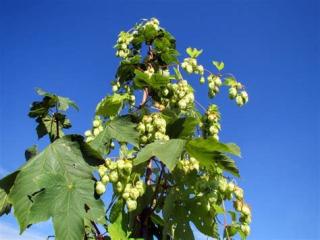Hops - Growing Hops in Early 1800s

Hop Growing in Berlin - by Henry Arthur Wheeler 1857-1935 (click for narrative)
Interesting Factoid About Hops ("factoid: (the CNN version): a little-known bit of information; trivial but interesting data." ...)
- "Farming ever has been the leading industry of the town, but since the advent of the railroad into the town, more attention has been made to horticulture and mixed farming. The nearness of large manufacturing villages in the vicinity has stimulated truck farming to a considerable extent. Formerly the hop culture was the leading cash product of the town. This continued to pay quite well from 1800 to 1820. In one year about 6000 pounds were raised, but times changed and the good times of hop pickers came to grief." History of Berlin, Worcester County Mass. from 1784 to 1895 written by William A. Houghton
- The farmhouse at 232 Pleasant St. (home of Cordelia's Farm) was paid for with income from hops production, a "cash crop" in latter 1700s. This information was given to Willard Wheeler by Florence (Hastings) Wheeler daughter of Arthur Hastings, Willard's grandfather.
- Brewing in North America began with the arrival of European settlers, who considered beer a staple of life, nearly as important as bread and water. Although hops were occasionally imported from Europe, the early pioneers carefully evaluated their potential homestead sites and the surrounding countryside not only in terms of the suitability for growing grain and raising cattle, but also for the availability of wild hops for beer brewing. They likely selected the best native hop plants around them, just as their European ancestors had done. The first cultivated hops were introduced in the the Unites States from Europe by the Massachusetts Company in 1629 to stabilize local hop availability. Hop Cultivation spread along the Eastern seaboard as new towns and communities provided support for hop production. The Puritans for example, were such successful hop producers they could eventually ship excess hops to the Quakers in Philadelphia. The Puritans also created a system of small land grants for hop gardens. From Beer Brewing Magazine
- Hops are the female flowers (also called seed cones) of the hop plant. They are used primarily as a flavoring and stability agent in beer, to which they impart a bitter, tangy flavor, though hops are also used for various purposes in other beverages and herbal medicine. In the Middle Ages beers tended to be of a very low alcohol content and were commonly consumed as a safer alternative to untreated water. Each village tended to have one or more small breweries with a barley field and a hop garden in close vicinity. From Wikipedia, the free encyclopedia

